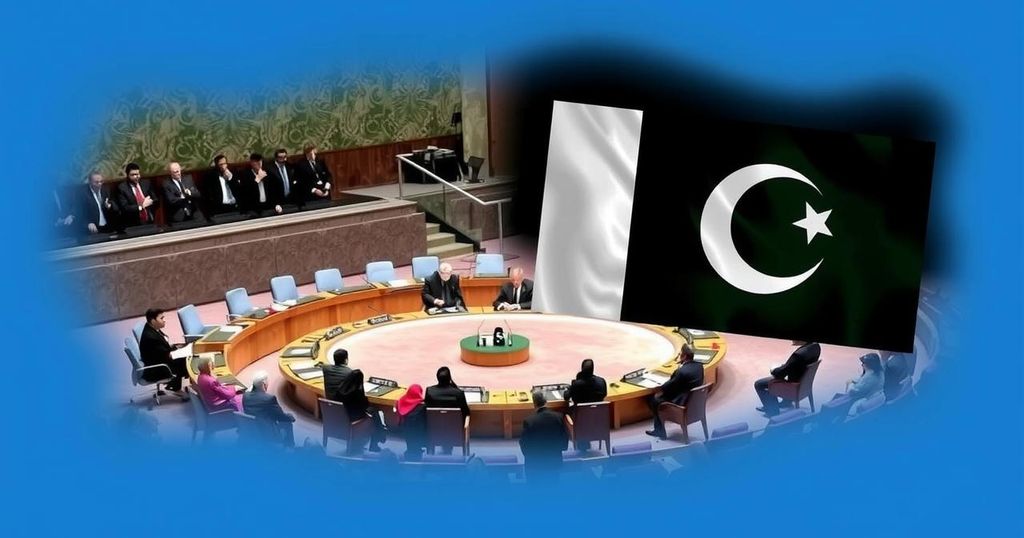Pakistan began its two-year term as a temporary member of the UN Security Council in January 2025. This opportunity is framed by Pakistani officials as a chance to promote global security and combat terrorism. However, skepticism remains due to Pakistan’s history of supporting terrorist organizations, particularly concerning its relations with India and issues surrounding Kashmir. The potential implications for regional security and international diplomacy are significant and require close monitoring.
On January 1, 2025, Pakistan commenced its tenure as a temporary member of the United Nations Security Council (UNSC) for a two-year period, marking the eighth occasion the nation has secured such a position. While Pakistani officials present this opportunity as a means for the country to actively engage in addressing global issues, apprehensions persist, particularly from India, regarding Pakistan’s history of utilizing terrorism as a policy tool and the potential ramifications of its UNSC membership for international security.
Pakistani diplomat Munir Akram emphasized his country’s commitment to providing “active and constructive solutions” to global challenges, including terrorism. This statement ostensibly suggests a dedication to combating terrorism; however, it contrasts sharply with Pakistan’s documented support for terrorist organizations operating within India and Afghanistan. The international community has historically reproached Pakistan for fostering groups such as Lashkar-e-Taiba and Jaish-e-Mohammad, which have perpetrated catastrophic attacks across India, notably the 2008 Mumbai incident. Hence, Pakistan’s professed commitment to counter-terrorism efforts within the UNSC is met with skepticism, raising doubts about its sincerity.
The UNSC plays a pivotal role in maintaining global peace and security, comprised of 15 members, including five permanent members and ten non-permanent members like Pakistan. During its term from January 2025 to December 2026, Pakistan will possess voting rights on various issues, despite lacking veto power. Although Pakistan can shape discussions and resolutions, its influence may be more pronounced in strategic contexts than in determining the outcome of resolutions put forth by other nations.
India remains vigilant as Pakistan takes its seat, concerned that it might leverage its UNSC position to further its longstanding agenda regarding Kashmir. Historically, Pakistan has consistently asserted itself on the Kashmir question in diverse international arenas, and it is anticipated that this trend will persist at the UNSC. Furthermore, Pakistan’s UNSC membership could enable favorable access to influential committees, such as the Islamic State and Al-Qaeda Sanctions Committee, which is responsible for sanctioning terrorist affiliates. There is a palpable fear that Pakistan might obstruct efforts aimed at penalizing terrorist organizations or advocate against measures targeting groups operating within its realm of influence.
Additionally, Pakistan’s involvement in the UNSC provides a platform to project its power, particularly among Islamic nations, portraying itself as a pivotal actor in the anti-terrorism landscape while simultaneously perpetuating narratives aligned with its geopolitical interests, notably regarding Kashmir and its rivalry with India.
In conclusion, Pakistan’s term at the UNSC symbolizes a critical juncture for demonstrating its allegiance to international peace and security. Nevertheless, its past behavior casts doubts over its intentions and commitment to these goals. Vigilant monitoring by the global community, especially by India, is essential to assess whether Pakistan will genuinely engage in countering terrorism or instead utilize its position to exacerbate regional tensions under the guise of anti-terrorism efforts. The implications of Pakistan’s term for global diplomacy and security remain uncertain but warrant careful evaluation.
Pakistan’s recent accession to the United Nations Security Council (UNSC) as a temporary member is significant, as it marks the eighth term for the nation on this influential panel. The UNSC is a central hub for addressing issues of international peace and security, comprising five permanent and ten temporary members. Pakistan’s inclusion follows a period in which it has been scrutinized internationally for its support of militant groups, which raises complex questions about its role in global counter-terrorism efforts, particularly in light of its contentious relationship with India. As it begins this new chapter, understanding Pakistan’s historical context of employing terrorism strategically is crucial to evaluating its future contributions to global security discussions.
In summary, Pakistan’s temporary membership in the UNSC presents an opportunity for the country to align itself with international peacebuilding efforts; however, its history of supporting terrorism poses significant challenges. The genuineness of Pakistan’s commitment to combating terrorism will be crucial to its legitimacy on the world stage and impacts global security dynamics. Careful scrutiny of Pakistan’s actions in the UNSC will be essential, given the geopolitical tensions with India and the potential for leveraging its position for national interests. The outcome of this term will reflect on Pakistan’s role within the international community, especially concerning anti-terrorism initiatives.
Original Source: www.financialexpress.com






